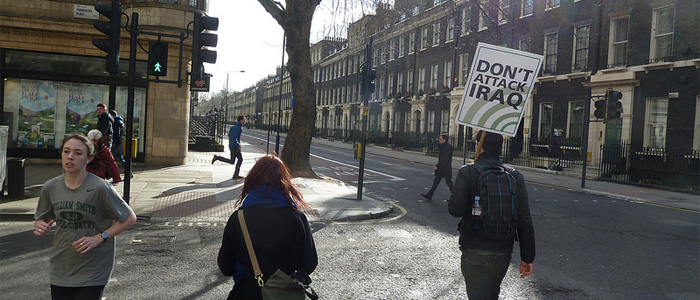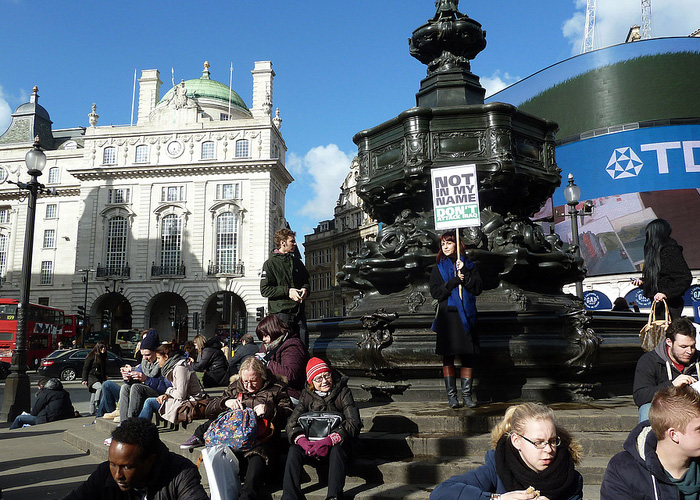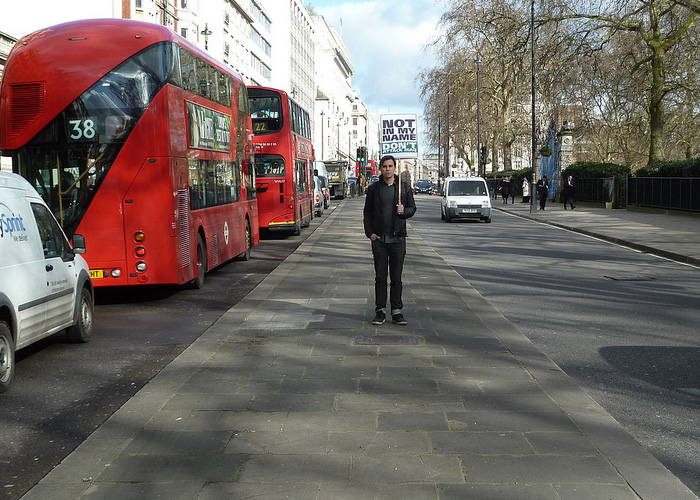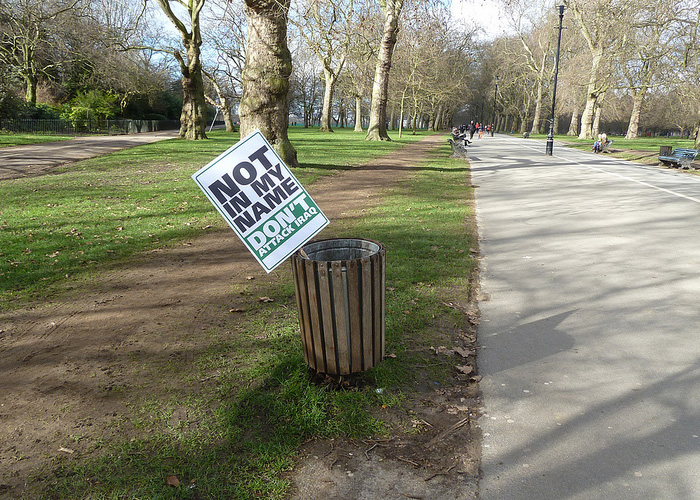Well, it’s been a long time between posts. Let’s try this on for size then… here’s the text of an article that Mita Williams and I (Lisa) published in the Summer 2012 issue of Access Magazine, the magazine of the Ontario Library Association. The issue was pulled together by Mike Ridley and the whole thing is devoted to social justice issues. Our piece is a call to arms, if you will excuse the battle metaphor. I like to think of it instead as a call to join arms. There are days when I am feeling more cynical about things than when we wrote this article – our attachment to commercial software and proprietary information vendors gets discouraging, and our seemingly eager embrace of the neoliberal values of the 21st century academy… but still, on a good day I think we can help change the world.
____________
Social Justice Librarianship for the 21st Century
In the fall of 2011 when the Occupy Movement invaded our collective consciousness, many of us were a bit taken aback to discover that most of the occupation sites included a self-described “People’s Library.” We were fascinated by this upstart movement and in particular why libraries were so central to it in a time when we seem to be continually told that our “brand” is no longer compelling. One librarian, in response to a tweet by one of the authors of this article, asked a simple question that still lingers in our thoughts. She asked why did Occupy Wall Street need a people’s library when there was a public library around the corner?
The obvious answer is that they needed a library on the occupation site itself and that building libraries is also about building communities. The less obvious and more painful answer is that although our profession is steeped in democratic values, libraries are not always seen as safe places by members of marginalized communities or by radical movements. Our relationships with corporate donors, commercial information vendors, and government can render us suspect to the very communities we wish to engage. At the same time, librarians know we make a difference to communities every day. Public libraries in particular are an important part of social safety net for a city’s most vulnerable residents. It’s not the 1% who use libraries, it’s the 99%. In acknowledging this contradiction in how we are perceived, we recognize that libraries are complex sites representing both the status quo and revolutionary potential.
While this contradiction is unlikely to disappear anytime soon, how might we at least expand upon the social justice potential of librarianship in our work? We recognize the progressive tradition documented in the work of Toni Samek, and think as well about Naomi Klein, who reminded us that librarianship is a revolutionary choice. Klein insists that our core values – which she saw as stewardship of knowledge, sharing, and the need for common space – are the ones most at risk in a globalized society. So how we can become the people’s librarians? To begin, let’s take a look at the work we take for granted but which to others might seem quite radical indeed. Once we’ve reframed librarianship as a subversive act, we can examine what else we might begin to do.
What’s so radical about peace, love and librarianship?
Public and academic libraries loan material for free, offer instruction in various forms of literacy, and bridge the digital divide by making computers and the web accessible to our patrons. We also engage in less obvious forms of social justice work, like our work on privacy and access to information.
Many think that the Internet is rapidly supplanting libraries and that the Internet is essentially a more convenient free alternative. Unfortunately, it takes a considerable understanding of the political and technological structure of the Internet to realize that in many cases what appears free on the internet is simply the extraction of value through other means. The “free” services of Google are provided by the revenue of AdSense, Google’s system of providing advertisements based on the content of your Gmail, your location, and your previous search history. Facebook is worth over $50 billion because it is provides not only an audience for advertising, but the most thorough demographic profiles available: a live census of our relationships and our shared experiences. Free web services are not free: we pay for them by providing the artifacts of our lives, our labour, and our privacy. Those in a position of privilege might think of this exchange of privacy for advertising and profiling as a fair one. There are many, however, who find themselves in a vulnerable position in society – perhaps through sexual orientation, religious affiliation, or political leanings – for whom exposure might threaten their livelihood, personal safety and/or families.
Librarians, on the other hand, are deeply committed to the privacy of our patrons. For instance, libraries already provide a safe haven to those most vulnerable and most coveted by marketers: our children. Unlike entertainment conglomerates and game companies – who both design free apps that make it all too easy for kids to make real purchases of virtual goods – libraries will not sell our children’s interests, their reading habits and their questions to the highest bidder.
Our concern for society’s unfettered access to information is also an increasingly radical notion. The fundamental bedrock of our work is based on the notion that ideas are free. This is not to say that authors or creators should not be compensated – it simply a statement that ideas are not physical objects that are reduced or diminished when shared with others. Indeed, ideas need to be shared across communities and across generations in order to survive. Libraries are slowly but methodically embracing the Open Access and Open Source movements which embody these fundamentals by allowing ideas to be shared by all.
Level Up: Get Involved. Get Visible. Unlock achievement
Once we recognize the ways in which our work often challenges the status quo, it seems logical to reach out to other groups engaged in similar social and political struggles. What else could we do and who should we work with? A recent blog post by Lana Thelen called “Out of the Library and into the Wild” does an excellent job of outlining how librarians can work with community and activist groups and begin to share our expertise and skills outside the walls of the library and in so doing make ourselves more visible and relevant to our communities. She talks about offering street reference, tabling at community events, hosting skillshares, marching under librarian banners at protests and parades, as well as about joining explicitly progressive groups like Radical Reference and the Progressive Librarians Guild.
These groups are important because librarians concerned about social justice need to build new professional networks and figure out how to work collectively. Simultaneously, we need to speak out, in all our diverse platforms, against surveillance technologies, privacy infringements, the commodification of information, and basically anything that locks down space or freedom of expression. At the same time, recognizing the diversity of views amongst us, we don’t want to exhort librarians to speak with one voice. We need to consider intersectionality and coalition building amongst each other, rather than falling deeper into the growing and perilous divide amongst front line librarians, IT professionals, and library administrators. We also need to extend beyond ourselves and build solidarity with citizens in our communities. We need to build relationships with communities, and with other activists – not with elevator pitches about how important we are, but by becoming integral to the social project. We fight with them, they fight for us.
Conclusion
We’d like to end by reminding you of the most obvious and radical thing we do. Libraries provide material for free to reduce financial barriers to information access. Some publishers and authors have taken umbrage at this service. You couldn’t invent libraries now, if they didn’t exist already. But those who work in libraries recognize the short-sightedness of this sort of thinking. We know that we create and support a reading public. We all benefit from literacy: writers, employers, educators, and citizens alike. But even more radically, our very existence provides an alternative vision to society – a vision of sharing rather than buying.
Why social justice librarianship? Here’s the simplest explanation we can think of: in these times of widespread access to information technology and various archival fevers, lots of people can probably do what we do, but we’re the only ones who do it for the reasons we do it. We sit squarely in the social conscience of the information world. We have to ask ourselves, what makes a library? Is it a room full of books? A delivery mechanism for commercial online products? No. It is the way the library workers animate our collections and critique the commercial entities where necessary. It is the attention to literacy and social values that differentiates librarianship from most other kinds of information professions. Dusted off, repolished and reframed for the 21st century, this attentiveness will be our calling card, our hallmark, our badge of honour.
References
Klein, Naomi. (June 24, 2003). Librarianship as a Revolutionary Choice. Address to the American Library Association, Toronto, ON. Accessed March 28th, 2012.
Samek, Toni. (2001). Intellectual Freedom and Social Responsibility in American Librarianship, 1967-1974. Jefferson, NC: McFarland & Company.
Thelen, Lana. (March 21, 2012). “Out of the Library and into the Wild” at In the Library with the Lead Pipe. Accessed March 28th, 2012.




